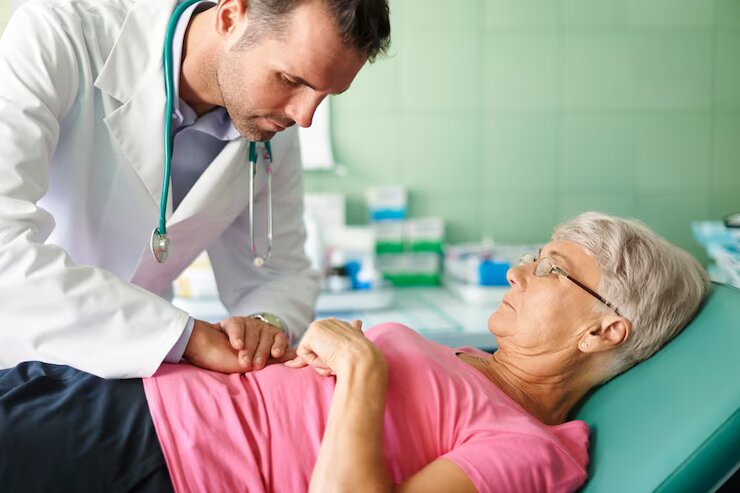Are you under the impression that only older adults are at risk of colon cancer? Think again. Recent studies have shown an alarming rise in the number of young adults diagnosed with this deadly disease. While colon cancer is still more prevalent in people over 50, it’s becoming increasingly common among those as young as their twenties and thirties. The reasons behind this trend are complex, but what we do know for sure is that awareness and early detection can help prevent or treat colon cancer effectively. In this post, we’ll explore why younger individuals are now more susceptible to colon cancer and what steps you can take to protect yourself against it.
What is colon cancer?
Colon cancer is a type of cancer that starts in the large intestine (colon). The colon is the final part of the digestive system, where food is absorbed into the body. Colon cancer typically affects older adults, but there has been a sharp increase in cases among young adults in recent years.
There are a few possible explanations for the rise in colon cancer cases among young adults. One theory is that the obesity epidemic may be to blame, as obesity is a risk factor for colon cancer. Another possibility is that people are simply more aware of the disease and are therefore more likely to get screened for it. However, the exact cause of the increase is still unknown.
While colon cancer is usually treatable if caught early, it can be deadly if it progresses unchecked. That’s why it’s important for everyone, especially young adults, to be aware of the signs and symptoms of this disease. If you experience any persistent changes in your bowel habits, such as bleeding or persistent abdominal pain, make sure to see a doctor right away.
The alarming rise of colon cancer among young adults
Colon cancer is the third most common cancer in the United States and the second leading cause of cancer death. The American Cancer Society estimates that there will be nearly 150,000 new cases of colon cancer and more than 50,000 deaths from the disease in 2018. While the overall incidence of colon cancer has been declining since the mid-1980s thanks to improved screening and prevention measures, there has been a disturbing increase in the number of young adults diagnosed with the disease.
According to data from the National Cancer Institute, the incidence of colon cancer in adults under age 50 has increased by about 2% per year since the mid-2000s. This rise is especially concerning because colon cancer is typically a disease of older adults, with more than 90% of cases diagnosed in people age 55 or older. The vast majority of young adults diagnosed with colon cancer are stage III or IV at diagnosis, which means they have advanced disease and a poorer prognosis.
There are several possible explanations for the rising incidence of colon cancer in young adults. One theory is that obesity and sedentary lifestyles are contributing to the increase, as these factors have been linked to an increased risk of colorectal cancer. Another possibility is that the use of certain medications (such as nonsteroidal anti-inflammatory drugs) or medical conditions (such as inflammatory bowel disease) may be playing a role. It’s also possible that changes in diet (such as a decrease in fiber intake and an increase in processed meat
Who is at risk for colon cancer?
If you’re under 50, you may think you’re too young to worry about colon cancer. But new research shows that the disease is on the rise among younger adults. In fact, colon cancer rates in adults under 50 have increased by nearly 60% over the last decade.
So who is at risk for colon cancer? Anyone can get the disease, but there are certain factors that increase your risk. These include:
• A family history of colon cancer or other gastrointestinal cancers
• Having inflammatory bowel diseases like Crohn’s disease or ulcerative colitis
• Having a personal history of colorectal polyps
• Being African American or Ashkenazi Jewish
What are the symptoms of colon cancer?
Colon cancer is the third most common cancer in the United States and the second leading cause of death from cancer. The American Cancer Society estimates that there will be over 96,000 new cases of colon cancer and over 49,000 deaths from colon cancer this year.
The symptoms of colon cancer can vary depending on the individual, but some common symptoms include:
-Abdominal pain or cramping
-A change in bowel habits (such as diarrhea or constipation)
-Blood in the stool
-Unexplained weight loss
– fatigue
-Unexplained anaemia (low blood count)
How can colon cancer be prevented?
There are a few things you can do to help prevent colon cancer:
1. Get screened regularly. The earlier colon cancer is caught, the better your chances are of beating it. Talk to your doctor about when you should start getting screened and how often you need to be checked.
2. Eat a healthy diet. A diet rich in fruits, vegetables, and whole grains and low in red meat, processed meat, and sugar can help reduce your risk of colon cancer.
3. Exercise regularly. Keeping active can help reduce your risk of colon cancer. Try to get at least 30 minutes of exercise most days of the week.
4. Don’t smoke or use tobacco products. Smoking is one of the biggest risk factors for all types of cancer, including colon cancer. If you smoke, quit as soon as possible. And if you don’t smoke, don’t start
What are the treatment options for colon cancer?
There are a few treatment options for colon cancer. The most common is surgery to remove the cancerous growth. This can be done through a traditional open surgery, or laparoscopic surgery, which is less invasive. Other treatments include chemotherapy and radiation therapy.
Conclusion
The alarming rise of colon cancer among young adults is a cause for concern and it is important to be aware of the risk factors so that you can take steps to protect yourself. Eating a healthy, balanced diet, getting regular exercise, and avoiding smoking are effective ways to reduce your risk. Additionally, booking regular checkups with your doctor will help ensure any potential issues are identified quickly and addressed appropriately. By taking care of our bodies we can all do our part in reducing the prevalence of this potentially deadly disease.












